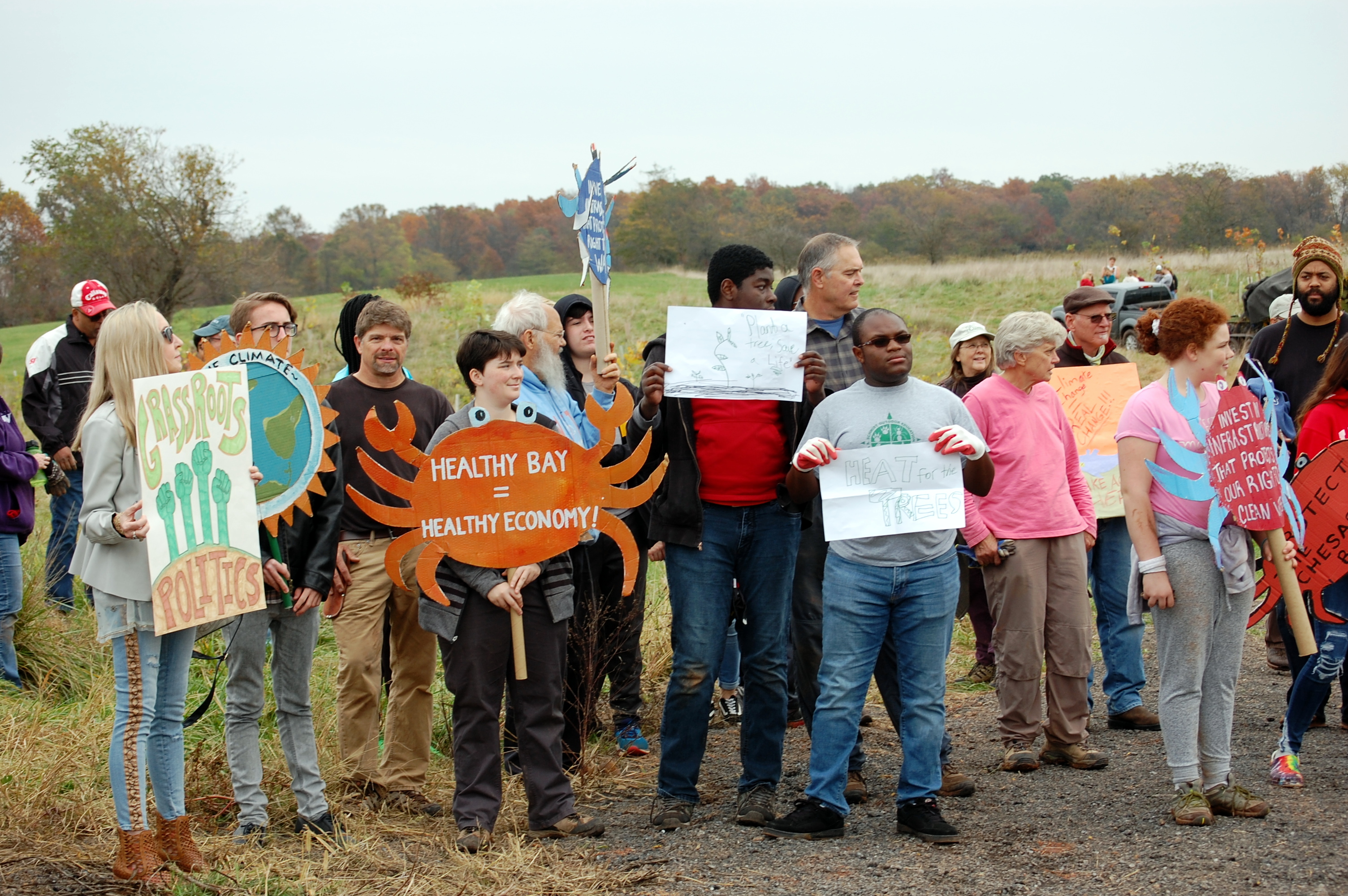
THURMONT — On Saturday, October 26, Stream-Link Education organized over one hundred volunteers to plant a new 6-acre forest on formerly open land in Thurmont, Maryland. After the planting, members of local conservation organizations including the Smarter Growth Alliance of Frederick County, the Sierra Club Catoctin Group, Multi-Faith Alliance of Climate Stewards, Climate Change Working Group of Frederick County, Clean Water Action, Potomac Conservancy, League of Conservation Voters, and Preservation Maryland called on Frederick County to stem forest loss in Frederick County and better preserve Frederick’s forests. Watch a video of the press conference here.
According to the recently-completed Livable Frederick Master Plan, Frederick County is losing 420.3 acres of forest each year; approximately 5,464 acres of forest were lost in the county from 2001-2014. If that trend continues, Frederick would lose over 2,000 acres between now and 2025 - an unacceptable loss to Frederick County’s air quality, the Monocacy River and local streams, climate resiliency, and quality of life.
Since 2014, Stream-Link Education has worked with landowners and volunteers in all corners of the County to plant 55 acres of new forest on formerly open land. "Volunteers are eager to help and our capacity to plant more trees has grown tremendously through that momentum,” said John Smucker. But volunteer-driven measures like this are not enough to counter forest loss in Frederick County.
“Forests play a critical role in our ecosystem. They naturally filter out pollutants from water, slow stormwater runoff, moderate and cool temperatures, clean the air, sequester carbon, house animals, and offer us places to play. But Frederick is losing too much forested land: from when I started sixth grade at Monocacy Middle School to when I graduated from college, Livable Frederick estimates we lost nearly 5,000 acres of forests in the county. That’s as though we had cut down all the trees in Gambrill State Park - more than four times over,” said Jennifer Kunze with Clean Water Action.
“Stream side forest buffers are nature’s equivalent of mans best friend. We simply can’t have healthy soils, clean air and water, or a thriving aquatic ecosystem without them. Clean and cool headwaters are absolutely vital to a sustainable and healthy bay, and that’s why we’re here reforesting this property. We owe a big thanks to Mr. Willard, the owner of this farm, for this opportunity,” said Matt Seubert, member of the Smarter Growth Alliance for Frederick County and a certified Frederick County Master Naturalist.
“We are near Big Hunting Creek. Above Cunningham Falls, this creek is home to Brook Trout, our only native trout, which is critically endangered by rising water temperatures due to climate change, as well as soil runoff and other pollutants. While these trees are not directly adjacent to the buffer that runs along the creek, they will help to filter out aquatic contaminants and promote habitat connectivity, while sequestering carbon,” said Karen Russell, founder and chair of the Climate Change Working Group of Frederick County.
With state-level forest conservation legislation stalled in Maryland for the past several years, Frederick County must lead by moving forward with strong forest conservation measures. “We can no longer wait for the state to protect Frederick’s forests. To care for the health and wellbeing of our neighbors and future generations, we must act locally is now,” said Barb Trader of the Multi-Faith Alliance of Climate Stewards.
Frederick County was recently recognized as the 2019 Chesapeake Forest Champion for the Alliance for the Chesapeake Bay and the US Forest Service, and County Executive Jan Gardner announced last week that there will soon be a proposal to strengthen the county’s Forest Resource Ordinance. “Forests are a beautiful and vital part of Frederick County's landscape and ecology. Thanks to a variety of local and state programs, more have been protected and new acreage has been planted. But, despite those efforts, we continue to lose forests here. Most of our forests are not permanently protected. We must take legislative action now to protect our mature forests and begin to make up for past forest loss,” said Frederick County Councilman Kai Hagen.
###